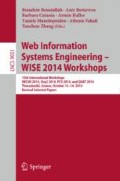Abstract
The banking industry is observing how new competitors threaten its millennial business model by targeting unbanked people, offering new financial services to their customer base, and even enabling new channels for existing services and customers. The knowledge on users, their behaviour, and expectations become a key asset in this new context. Well aware of this situation, the Center for Open Middleware, a joint technology center created by Santander Bank and Universidad Politécnica de Madrid, has launched a set of initiatives to allow the experimental analysis and management of socio-economic information. PosdataP2P service is one of them, which seeks to model the economic ties between the holders of university smart cards, leveraging on the social networks the holders are subscribed to. In this paper we describe the design principles guiding the development of the system, its architecture and some implementation details.
Access this chapter
Tax calculation will be finalised at checkout
Purchases are for personal use only
References
Schwab, K., Marcus, A., Oyola, J. R., Hoffman, W.: Personal Data: The Emergence of a New Asset Class. An Initiative of the World Economic Forum (in Collaboration with Bain & Company, Inc.) (2011). http://www3.weforum.org/docs/WEF_ITTC_PersonalDataNewAsset_Report_2011.pdf
Gonzalez, F.: Banks need to take on Amazon and Google or die. Financial Times (2013). http://www.ft.com/intl/cms/s/0/bc70c9fe-4e1d-11e3-8fa5-00144feabdc0.html
Auerbach, P., Argimon, R.F., Hieronimus, F., Roland, C., Teschke, B.: Banking on Customer Centricity - Transforming Banks into Customer-Centric Organizations. McKinsey & Company, EMEA Banking Practice (2012)
Chaia, A., Dalal, A., Goland, T., Gonzalez, M.J., Morduch, J., Schiff, R.: Half the World is Unbanked. Financial Access Initiative Framming Note (2009). http://www.gsma.com/mobilefordevelopment/wp-content/uploads/2012/06/110109halfunbanked_0_4.pdf
Observatorio TUI, International University Smart Card Research Centre. http://en.observatoriotui.com/home
Working Party on Security and Privacy in the Digital Economy: Protecting Privacy in a Data-driven Economy: Taking Stock of Current Thinking. Organisation for Economic Co-operation and Development (2014)
Windley, P.: Digital Identity. O’Reilly Media Inc., Sebastopol (2005)
Fröschl, C.: User Modeling and User Profiling in Adaptive E-learning Systems. Master’s thesis, Graz University of Technology (2005)
Barla, M.: Towards Social-based User Modeling and Personalization. Dissertation thesis, Slovak University of Technology in Bratislava (2014)
Facebook Developers, The Graph API. https://developers.facebook.com/docs/graph-api
Twitter Developers. https://dev.twitter.com/
OpenSocial. http://opensocial.org/
Nabeth, T.: D2.3: Models. Deliverable. In: Future of Identity in the Information Society Consortium (2005)
Sosnovsky, S.: Ontological Technologies for User Modeling. Committee of the School of Information Sciences, University of Pittsburgh (2008)
Kuflik, T., Kay, J., Kummerfeld, B.: Challenges and solutions of ubiquitous user modeling. In: Krüger, A., Kuflik, T. (eds.) Ubiquitous Display Environments, pp. 7–30. Springer, Heidelberg (2012)
Álamo, J.M., Fernández, A.M., Trapero, R., Yelmo, J.C., Monjas, M.A.: A Privacy-Considerate Framework for Identity Management in Mobile Services. Journal Mob. Netw. Appl. 16(4), 446–459 (2011)
Bhargav-Spantzely, A., Camenisch, J., Gross, T., Sommer, D.: User centricity: A taxonomy and open issues. J. Comput. Secur. - Second ACM Workshop Digit. Identity Manag. 15(5), 493–527 (2007)
The OAuth 2.0 Authorization Framework. https://tools.ietf.org/html/rfc6749
Wright, D., Raabb, C.: Privacy principles, risks and harms. Int. Rev. Law, Comput. Technol. 28(3), 277–298 (2014)
Noy, N.F., McGuinness, D.L.: Ontology Development 101: A Guide to Creating Your First Ontology. Technical report, Stanford Knowledge Systems Laboratory (2001)
Foaf project. http://www.foaf-project.org/
DBpedia. http://dbpedia.org/About
Notario, N., Crespo, A., Kung, A., Kroener, I., Le Métayer, D., Troncoso, C., del Alamo, J.M., Martín, Y.S.: PRIPARE: a new visión on engineering privacy and security by design. In: Cleary, F., Felici, M. (eds.) CSP Forum 2014, CCIS, vol. 470, pp. 65–76. Springer, Heidelberg (2014)
Protégé. http://protege.stanford.edu/
Apache Jena. https://jena.apache.org/
Kobsa, A.: Generic user modeling systems. In: Brusilovsky, P., Kobsa, A., Nejdl, W. (eds.) Adaptive Web 2007. LNCS, vol. 4321, pp. 136–154. Springer, Heidelberg (2007)
Aroyo, L., Houben, G.J.: User modeling and the adaptive semantic web. J. Semant. Web 1, 1–6 (2010)
Shapira, B., Rokach, L., Freilikhman, S.: Facebook single and cross domain data for recommendation systems. J. User Model. User-Adap. Inter. 23(2–3), 211–247 (2013)
Ortigosa, A., Quiroga, J.I., Carro, R.M.: Inferring user personality in social networks: A case study in Facebook. In: 11th International Conference on Intelligent Systems Design and Applications, pp. 563–568. IEEE, New York (2011)
Kabir, M.A., Han, J., Yu, J.: Alan Colman User-centric social context information management: an ontology-based approach and platform. Pers. Ubiquit. Comput. 18(5), 1061–1083 (2014)
Orlandi, F., Breslin, J., Passant, A.: Aggregated, interoperable and multi-domain user profiles for the social web. In: 8th International Conference on Semantic Systems, pp. 41–48. ACM, New York (2012)
Abel, F., Herder, E., Houben, G.J., Henze, N., Krause, D.: Cross-system user modeling and personalization on the Social Web. User Model. User-Adap. Inter. 23(2–3), 169–209 (2013)
Acknowledgments
This work is part of the Center for Open Middleware (COM), a joint technology center created by Universidad Politécnica de Madrid, Banco Santander and its technological divisions ISBAN and PRODUBAN.
Author information
Authors and Affiliations
Corresponding author
Editor information
Editors and Affiliations
Rights and permissions
Copyright information
© 2015 Springer International Publishing Switzerland
About this paper
Cite this paper
San Miguel, B., del Alamo, J.M., Yelmo, J.C. (2015). Creating and Modelling Personal Socio-Economic Networks in On-Line Banking. In: Benatallah, B., et al. Web Information Systems Engineering – WISE 2014 Workshops. WISE 2014. Lecture Notes in Computer Science(), vol 9051. Springer, Cham. https://doi.org/10.1007/978-3-319-20370-6_13
Download citation
DOI: https://doi.org/10.1007/978-3-319-20370-6_13
Published:
Publisher Name: Springer, Cham
Print ISBN: 978-3-319-20369-0
Online ISBN: 978-3-319-20370-6
eBook Packages: Computer ScienceComputer Science (R0)

